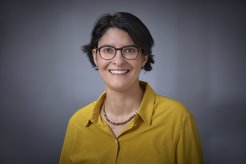Anuscheh Farahat Named Max Planck Fellow
Anuscheh Farahat, Professor of Public, Migration and Human Rights Law at Friedrich-Alexander-Universität Erlangen-Nürnberg (FAU), has been selected as a Max Planck Fellow by the President of the Max Planck Society. The five-year fellowship is hosted by the Max Planck Institute for Social Anthropology and includes funding for two doctoral researchers. She will join the MPI early next year to work on her project entitled “Labour Migration Regimes”. We talked with Anuscheh Farahat about her project and what she hopes to achieve.

Professor Farahat, congratulations on your appointment as Max Planck Fellow at our Institute! Tell us a bit about how this happens – is it possible to apply for such a fellowship, or must one be nominated?
Thank you very much. I was of course very pleased to receive the fellowship, which provides me an opportunity for intensive collaboration with colleagues in Halle for the next several years. It’s not possible to apply for a Max Planck Fellowship; candidates are nominated and then asked to submit a proposal for the project they would work on during the fellowship.
The project you chose for your fellowship is titled “Labour Migration Regimes”. What concretely will you be studying?
I’m interested in examining the wide variety of forms of labour migration that we can observe today. While the various legal instruments for controlling and channelling migration will play a role in my project, I will also rely on concepts from anthropological and sociological migration studies.
What insights do you hope to gain from this multidisciplinary approach?
The social practice of labour migration is influenced by many different variables. The prevailing legal norms are one factor, but other elements such as the labour market, the political situation, employers, recruiters and private employment agencies, social networks, and cultural factors are also important. In order to adequately capture this complex context, it is useful to supplement the legal analyses with methods and perspectives from other disciplines.
What concepts from anthropological and sociological migration research do you see as particularly promising for your project?
Two important terms in social science research are “migration infrastructures” and “migration regimes”. The analytical concept of migration infrastructures is based on the observation that migration is shaped not just by legal and bureaucratic systems, but also by the means and paths of communication, by transportation infrastructure, the activities of NGOs, and of course by the particular knowledge and interests of the actors themselves.
And what is meant by migration regimes?
The theoretical concept of the migration regime is concerned with understanding how regulative instruments for governing migration are created and dynamically developed. In other words: How are the interests of the various actors negotiated? Who has the most power in these negotiations? In addition, how are rules applied in practice, renegotiated, reinterpreted, or overruled? In order to answer these questions, I will combine analysis of legal doctrine with methods from legal anthropology. In this way, it is possible to look at all these cultural, political, and economic variables that influence migration patterns while also giving due attention to the underlying power structures. The multidisciplinary approach more successfully captures migration as an extraordinarily complex and contingent process that cannot be controlled or understood merely by means of legal norms.
And how will the collaboration with anthropologists help to gain a better understanding of labour migration processes?
The perspective of the actors themselves is a central part of anthropological research. And it is this perspective that I am particularly interested in in this project. I want to better understand how people navigate things like the varying legal regulations. Are the laws helpful or a hindrance; do they encourage migration or discourage people from doing so? When, where, and how is the law circumvented, adapted, or used for personal ends? How does law itself create exclusion – for example, in the phenomenon of so-called illegal migration? Unless we have reliable data on such factors, we cannot effectively control and channel the multi-layered process of labour migration.
What would appropriate management of migration look like?
It is doubtful whether current forms of labour migration, which is often short-term and thus entails a great deal of mobility, are sustainable – both with respect to climate change and in terms of the integration and the upward social mobility of the migrants in the host countries. It is in the interest of both migrants and host societies to develop effective, long-term, and reliable solutions that do not primarily rely on seasonal requirements or temporary demand for workers.
How will you gather the data that is needed for this type of planning?
The fellowship grant allows for the employment of two doctoral researchers who will conduct case studies. We will focus on labour migration from third countries to two EU states. One of the studies will look at the migration of unskilled workers and the other with highly skilled employees in STEM fields. The studies will be based on analysis of the legal norms and decisions on the one hand, and interviews with various actors involved in the migration process on the other. And of course, anthropological fieldwork will also make up an important part of the project. Alongside the empirical research we will then work together with Marie-Claire Foblets and Biao Xiang to develop a conceptual and analytical tool-kit to understand law and law-making as a social process; this will enable us to arrive at a deeper understanding of labour migration.
And what are the next steps at present?
The doctoral positions will be advertised shortly, with the goal of starting our research activities in the first quarter of 2023.
